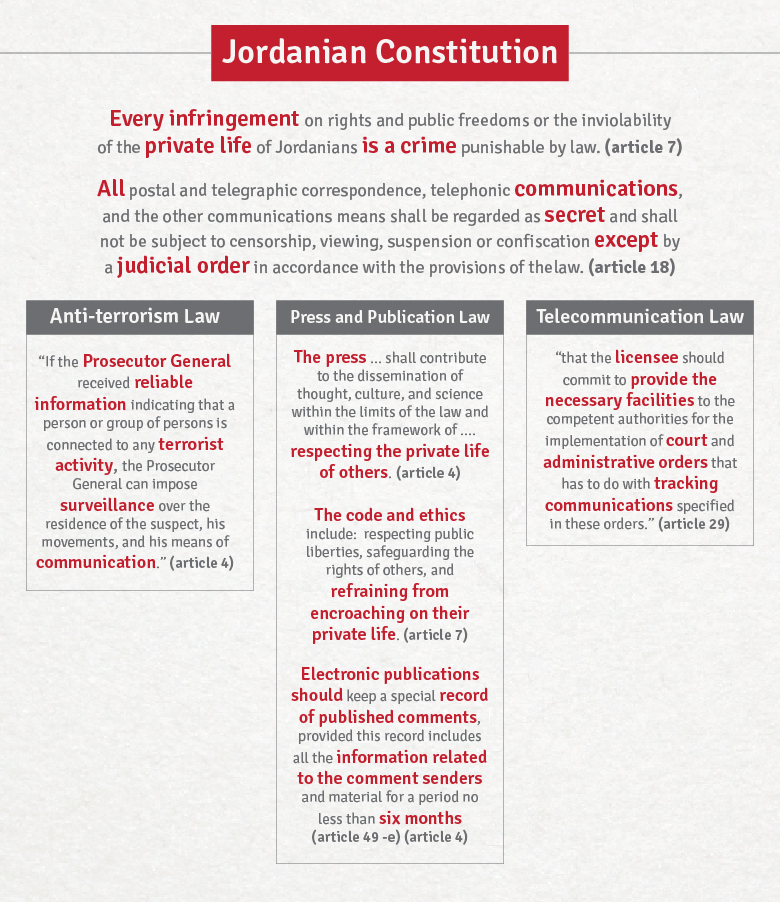Every time we touch our mobile phones, our laptops, or our smart fridge, it is likely that we are injecting information about ourselves. While we do not realize the extent to which data brokers are thriving on our personal data, we are still learning about how the collection and storage of it is impacting our lives and choices. The struggle to define the border between the private and public zones is continuous and is exemplified by companies pledging their data collection practices as ethical, governments seeking to collect more data as a method of control, but also others continuously developing data protection and digital security tools.
While the right to privacy is protected by the Jordanian constitution, it has always been contested in social and political spheres, from the sense of entitlement that your acquaintances and your neighbors have to your health and financial information, to the use of your information by telecommunication companies for commercial gains. It is conventional knowledge in Jordan that there is always “someone” listening in, or that “the walls have ears”, and in the protests of 2011, activists called for an end to the General Intelligence Department’s interference in citizens’ private lives.
During the parliamentarian elections of 2012, a Jordanian candidate went live on camera with around 9,000 personal ID cards on a table in front of him, gathered by his representatives. He publicly threatened to burn these cards if the Prime Minister decided to raise the prices of electricity or water. In another incident, the Independent Electoral Commission published the names of citizens who registered for elections but never picked up their elections cards. None of these incidents triggered any public debate on privacy concerns. On the business level, many citizens complain about ISPs selling their phone numbers to advertisement agencies, or fast food delivery call centers giving away the location of the caller without verification.
With this in mind, and amidst the global debate on the right to privacy, 7iber and the Information and Research Center – King Hussein Foundation teamed up to delve deeper into the meaning of “digital privacy” among active human rights actors in Jordan. The qualitative research “Digital Privacy in Jordan: Perceptions and Implications among Human Rights Defenders” explores the interplay between the perception of privacy and behaviors taken to secure data on the personal and professional level.
Internet is insecure, but still a space for mobility
The proliferation of Internet penetration in Jordan to 70%, and the high dependence on social networks in communication not only changed the concept of private spaces for users, but also the tools that individuals, governments and private companies use to store, manipulate and share data. The human rights actors in this research acknowledged the gaze of private companies and employers into their data, and perceived the access of official entities as the most threatening.
Although their trust in the security of their communication tools decreased, most of the research participants still thought of the Internet as an important space to spread human rights awareness and critique policies. Their perception of being surveilled did not discourage them from being publicly political, but rather more conscious about protecting their personal information that included their family and relationship affairs.
Perceptions formulated by first and second-hand stories
At the time of writing this research, there was no centralized public documentation of privacy violations by either private or public entities. In the media, very few stories emerge on data collection and violations of access. For example, in 2013, Ayman Bahrawi was charged over a WhatsApp message that said “Sisi is more brutal than Bashar”. These stories, plus first and second-hand stories that participants experienced, formulated their perceptions of their digital privacy. Stories ranged between hearing a replay of a journalist’s conversation with a source, hacking attempts, leaked emails, and others.
Awareness does not translate into using security tools
Very few participants used technical information security tools (PGP mail encryption and Tor). For the majority, protecting data simply meant not making it public or sharing it electronically. For example, the more politically active the participants were, the less personal information they shared on social media platforms. When it came to protecting the information of others, journalists and NGO workers used more drastic measures: they either changed their communication behavior to face-to-face interaction especially handling sensitive information; or concealed or erased their sources’ names on their devices.
Rather than adopting new digital protection tools, the spectrum of tools used amongst participants was basic and responsive to the local context.
Protection of Privacy in the Jordanian Law
While the constitution protects privacy by requiring a “judicial order” to access private data, there are several laws that permit the breach of privacy: the Telecommunication Law requires ISPs to answer any judicial or administrative requests for users’ information or tracking communications. This means that the Telecommunication Regulatory Commission (TRC), the police department and the mayor or anyone with an administrative authority can be listening in to your calls if this law was applied. The the Anti-terror law on the other hand allows the General Prosecutor to impose surveillance on means of communication if he/she was a subject of terror suspicion; and finally the Press and Publication Law requires websites to collect information about commenters for at least six months.
Regulating data access to private communication or information in Jordan places an overlap between executive and legal powers. The findings in this research should be understood within the time context it was conducted in, early 2014, before the amendment of the anti-terror law. Starting August 2014, many citizens were persecuted for private messages found on their phones. Although interviews on this research were conducted prior to these amendments, for participants regulating access to private data is a priority. Find out more by reading the full report Digital Privacy in Jordan: Perceptions and Implications among Human Rights Actors, available on 7iber’s website, IRCKHF’s website and HAQQI Information Zone.
This research was supported by the Cyber Stewards Network with aid of a grant from the International Development Research Centre, Ottawa, Canada. An Arabic version will produced

A glimpse into the perception of “digital privacy” in Jordan
Executive Summary Edward Snowden’s revelations set off a global debate about how states and the private sector should protect theRead More








